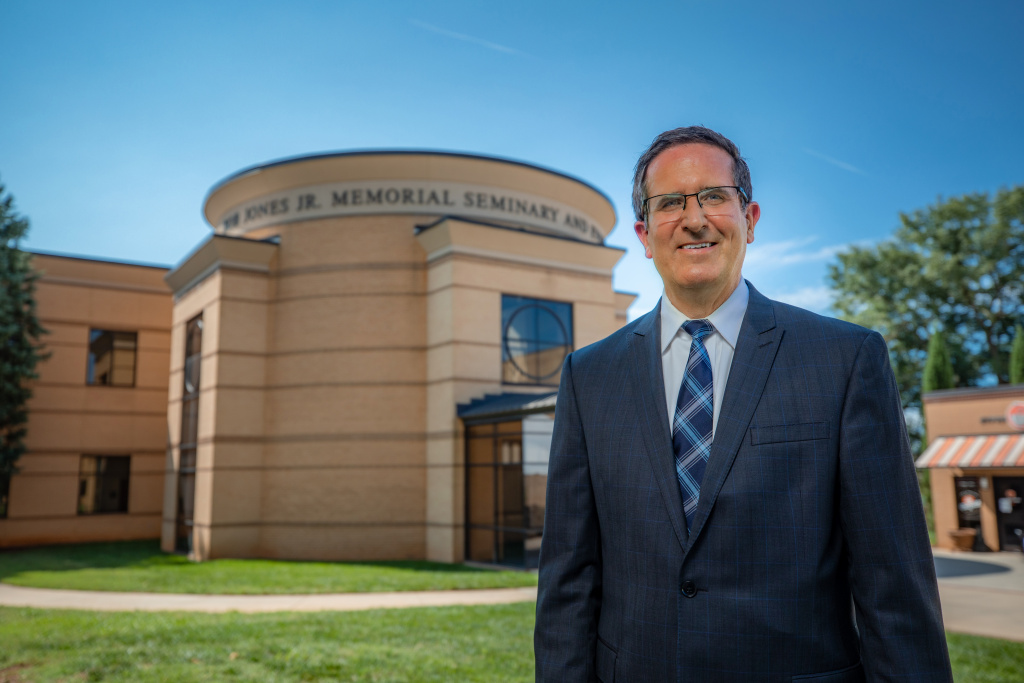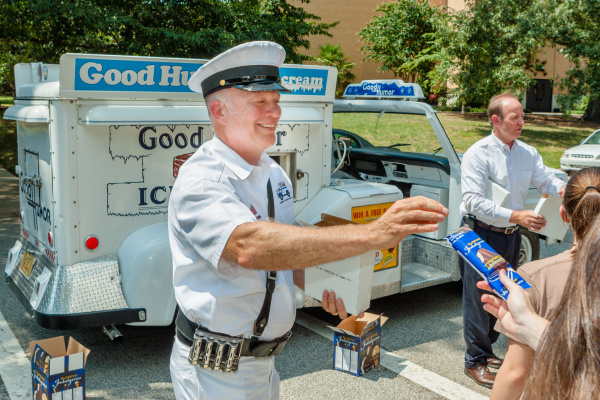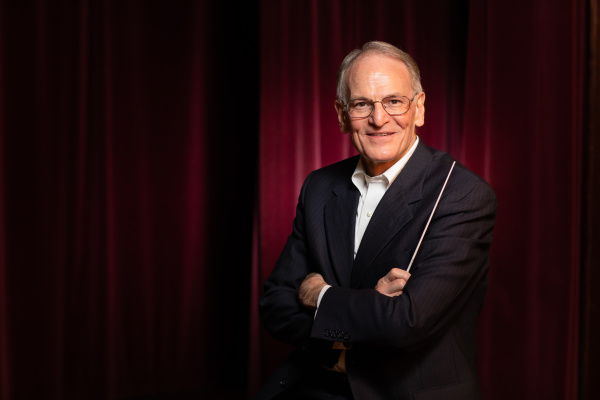“Prior to (attending) BJU, I had never really thought that much about my own involvement in missions,” said Dr. Neal Cushman, who was appointed dean of BJU Seminary this summer. “(But) as a (BJU) freshman, I was in (either) a student body or missions chapel, and during that service, the Lord just really impressed on my heart the need for missions, and I felt compelled personally to respond to that.”
As he regularly prayed for European missionaries at Mission Prayer Band (now Missions Advance), Cushman felt led to serve in Germany, even though the Berlin Wall divided Europe at the time. To prepare for this goal, “I read who was there and some of the needs (being met), … I took German, and I was trying to look for a way to go on a team so I could get some hands-on, experiential training,” he explained. “(However), at that point no one that I knew of was taking any teams to any part of Europe.”
See Also: Learn more about BJU Seminary programs
Then his roommate told him that a team was going to Nova Scotia, where many Europeans had settled. Cushman met with the team leader, BJU faculty member Nelson McGeoch, who had begun taking teams there a year or two before. “He would take students in a directed missionary training program that would last about 10 weeks in the summer,” Cushman said. “I would be exposed to new church plants and children’s work (as well as) day camps, overnight camps, radio broadcast (and) evangelistic outreach work.”
Cushman decided to go on the trip, and it changed him. “The Lord really got a hold of my life,” he said. “I think that one of the biggest things was that I … saw for the first time that God could use me, an imperfect vessel … in his work.”
Starting a Camp
On the last day of the trip, McGeoch and a local pastor asked Cushman if he would be interested in returning to start a youth camp on an 88-acre property the church owned 200 miles away. After praying about it for a few weeks, Cushman agreed, provided he could collaborate with a friend from his home church.
The next summer, he and his friend returned to Nova Scotia and began preparing for one day camp and one boys’ overnight camp. “There was a 100-year-old house on the property that was bat infested, it was tilting, it leaked everywhere and there was no way to cook food or anything, so we had to get all those things in order,” Cushman said. He and his friend did almost all the work themselves.
Once they had made the repairs to the property, they were ready for the overnight camp. Said Cushman: “We had been out in the fishing villages looking for campers, basically going door to door recruiting campers, giving flyers, encouraging boys to come to the camp. Everybody kind of knew us, they knew what we were doing down there, but they were maybe kind of suspicious of (the camp).
“So, on Monday morning, the day that camp was supposed to start … not a single soul showed up. I said to my friend who worked with me, … ‘This is unacceptable. We can’t have camp with no campers.’ So … our only source of transportation was a BJU school bus that we were allowed to use for the summer … (and) I said, ‘Let’s go find some campers.’ … We went back to those same houses and we said, ‘You know, (we) know $15 for a week of camp (is) a lot of money, but you can come for free if you want to.’ By the end of the day, we had 15 boys on the bus with their sleeping bags and their gear.”
Moving to Nova Scotia
After spending subsequent summers leading the camp during his undergraduate years, Cushman began to feel God calling him to serve in Nova Scotia permanently.
“(I got) involved like that, and the Lord started to kind of cement in my mind and my fiancé’s — we got married in the middle of our senior year — that this was really where the Lord wanted us,” he said. After he finished his master’s degree and they raised full-time support, the Cushmans moved to Nova Scotia to plant churches and lead camps.
Transitioning to Northland
While the Cushmans were on their first furlough, Cushman wanted to visit Dr. Les Ollila — president of Northland International University (then Northland Baptist Bible College) — whom he had not seen for at least six years. Cushman explained, “(He was) my youth pastor growing up … and when my dad died (when I was 16) … I was really floundering. That’s when Les Ollila really reached out to me even more, and I began to read my Bible and to pray and really grow for the first time in my life, even though I was saved when I was younger.”
Ollila invited Cushman to teach and preach to the students while he visited. “The Lord gave me a wonderful opportunity to mix with the students, and they were very responsive,” Cushman said.
A year and a half later, the Cushmans reached a transitional period in their ministry. “We had a pretty good nucleus of people (in the church), and we thought that it would be best for a Canadian to take it from there,” he said. “We would go on to do something else, but I could not get Northland out of my head at that point and the need to be involved in the training process.”
Additionally, Northland wanted help training its students for missions. “Their missions guy was older and really needed some help,” Cushman said. “So we prayed long and hard, and they reached out to us again, and so we decided that that’s where we should go.”
God’s timing was perfect because not long after the Cushmans arrived at the college, the missions director was suddenly diagnosed with cancer and passed away about a month later. “That put me into (his) role — not just helping him but actually leading the missions efforts,” Cushman said.
During his 22 years at NIU, Cushman served the students on campus as well as off campus by teaching and leading mission teams to Africa, Europe and Asia. He also helped start the school’s Center for Global Opportunities, which he described as “a center for international students, for mission team work (and) for study abroad.” With experience with that organization, he was able to help launch the CGO at BJU soon after he came to teach in 2015.
Reflecting on God’s Leading
God has placed Cushman in each ministry to prepare him for other opportunities of service. Said Cushman: “When you’re going through things, you never really know why you’re experiencing (them). And I’m not going to say this always happens, but often it happens that it becomes evident later on why the Lord had those things happen in your life.
“Like for me, one of the very vivid things was (that) when I was a student here going into grad school, I applied to be a Greek GA, but there was a lot of competition and I didn’t get it. So, I had to make a living somehow, and I, along with two other guys, decided to start this construction company. We had no experience, no understanding, no tools, no anything, but we figured that we would somehow make it work. We got hired on some jobs, and we struggled our way through to make it work.
“Well, so here I was kind of disappointed that I didn’t get the GA position, but the construction experience is exactly what God wanted for me because later on, I had to build these buildings in Nova Scotia. And I would have never known how to do that unless I had that experience of God directing me to get involved in construction work.
“And the same thing happened at Northland. There were a lot of needs there — a lot of building needs. (Right when I got there), they needed to remodel the dining hall, and so I got put in charge of that. I just didn’t expect that that would happen, but that’s the way the Lord works. He always prepares you for the kinds of things that he wants you to do. And so we shouldn’t be surprised when the Lord puts those things in our pathway.”
Trusting as God Leads
As God has led Cushman, He has impressed on him the truth of Proverbs 3:5–6. “It always comes back to my mind how foundational it is to trust the Lord with all your heart and not lean on your own understanding,” Cushman said. “That’s so easy for me to do because my personality is kind of entrepreneurial. I’m not afraid to take on new projects, new things. But that can also produce a certain amount of self-sufficiency.
“(When you are self-sufficient), God brings failure into your life, and you realize that you really need to trust the Lord, cling to Him and acknowledge Him (in) everything that happens in your life. (That’s when) you’re … seeking God’s direction. I think that’s the overarching thought of (my life) — am I fully trusting God for my life, for this day? Because if I’m self-sufficient, then there’s really no place for the Lord in my life. I need Him.”








